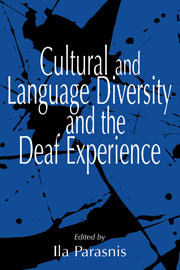Book contents
- Frontmatter
- Contents
- Preface
- PART I BILINGUALISM-BICULTURALISM AND THE DEAF EXPERIENCE: AN OVERVIEW
- PART II PSYCHOSOCIAL, COGNITIVE, AND LANGUAGE EXPERIENCES OF DEAF PEOPLE
- 5 From the Cultural to the Bicultural: The Modern Deaf Community
- 6 Early Bilingual Lives of Deaf Children
- 7 Communication Experiences of Deaf People: An Ethnographic Account
- 8 Marginality, Biculturalism, and Social Identity of Deaf People
- 9 Attitudes of the Deaf Community Toward Political Activism
- 10 Cultural and Language Diversity in the Curriculum: Toward Reflective Practice
- 11 Minority Empowerment and the Education of Deaf People
- 12 Social Assimilation of Deaf High School Students: The Role of School Environment
- PART III THE DEAF EXPERIENCE: PERSONAL REFLECTIONS
- Name Index
- Subject Index
9 - Attitudes of the Deaf Community Toward Political Activism
Published online by Cambridge University Press: 05 June 2012
- Frontmatter
- Contents
- Preface
- PART I BILINGUALISM-BICULTURALISM AND THE DEAF EXPERIENCE: AN OVERVIEW
- PART II PSYCHOSOCIAL, COGNITIVE, AND LANGUAGE EXPERIENCES OF DEAF PEOPLE
- 5 From the Cultural to the Bicultural: The Modern Deaf Community
- 6 Early Bilingual Lives of Deaf Children
- 7 Communication Experiences of Deaf People: An Ethnographic Account
- 8 Marginality, Biculturalism, and Social Identity of Deaf People
- 9 Attitudes of the Deaf Community Toward Political Activism
- 10 Cultural and Language Diversity in the Curriculum: Toward Reflective Practice
- 11 Minority Empowerment and the Education of Deaf People
- 12 Social Assimilation of Deaf High School Students: The Role of School Environment
- PART III THE DEAF EXPERIENCE: PERSONAL REFLECTIONS
- Name Index
- Subject Index
Summary
Introduction
We live in a democratic society in which all of us should have the right to be politically active in various ways. But is this really true? Historically, it has been demonstrated that not all Americans have had equal opportunities to participate in the political process. Deaf people are one of the several minority groups who have experienced a sense of oppression and feeling of futility in changing their lives. In other words, many deaf people feel a sense of “civic disenfranchisement” (Verlinde, 1987, p. 97). They feel that they have little voice in the decision-making processes that would determine their political, social, and economic futures. Some feel victimized by the larger hearing society. As Higgins (1980) states in his study, many deaf adults feel that they are “outsiders in the hearing world.”
It is a widely accepted view that an important way for people to feel a part of the decision-making process of the government is by voting. As Gaventa (1980) has noted, in a democracy, voting in elections is a principal means by which the deprived public may act upon its concerns, since candidates chosen as representatives are mandated by the electorate to act upon their interests.
- Type
- Chapter
- Information
- Cultural and Language Diversity and the Deaf Experience , pp. 146 - 159Publisher: Cambridge University PressPrint publication year: 1996
- 3
- Cited by



